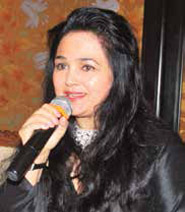
Alisha Chinai speaks to Rotary on entertainment
Alisha Chinai

Alisha has to her credit, innumerable albums, most of them making itto platinum level status. From her debut in ‘Evita’ in 1985 to ‘Made in India’— the album that shot her to fame in 1995, Alisha Chinai has been nothing short of India’s very own pop music icon.In a chat with R/ann Umme-Haani at the Ballroom at the Taj Mahal Palace, Alisha chinai opened up about her musical journey, her ‘pop diva’ status and the music scene in India, among other things.
Alisha: I just want to say it is such a pleasure being here among all of you Rotarians and Nirav is a cousin,so first of all I want to congratulate him for becoming President this year. I’m sure he’s going to do a great job. As I am not good at giving speeches, I’m going to let Umme-Haani take over.
Umme-Haani: Alisha, can yourecount your musical journey forus?
Alisha: I have sitting right here, someone who was a big part of thebeginning of my musical journey—Dolly Thakore. When I was in Evita, I got chosen to play the part of Peron’s mistress, and that was the first time I was ever on stage.I got a standing ovation and it was very very encouraging. After Evita, HMV came up to me and said,“Would you like to sign up with us and do some solo albums?” and I was like, “Oh ya! Sure!”. And ever since then I have done Jaadoo and Aah Alisha and a lot of other pop albums. But at that time it was really tough because all you heard was film music, and breaking the mould at that point was quite difficult and I had to just hang in there. But of course with Disco Deewaney, Nazia Hasan revolutionised the whole pop scene, but I think ‘Made in India’ really did it for me — that was my anthem. It is the largest-selling pop album in Indian music history.
Umme-Haani: Amazing. You have also done playback singing…
Alisha: Yes. Playback singing is something that I have always done parallely with pop singing. For me, it’s like a fallback because the reach to the masses through playbackmusic is immense.
Umme-Haani: tell us about yourself. You have manycontroversial singles to yourcredit—sexy sexy sexy, tarzan— and then you also have the imageof the pop Diva. How did these
titles find you?
Alisha: I don’t know. I think they just evolved as I progressed throughmy career. My management at one point wanted to give me a veryparticular image and distinctive sound and ‘Baby doll of India’ did just that. It created a bubble gum pop sound that the younger generationcould dance to and relate to. After this, I progressed to ‘Madonna ofIndia’, by doing her covers in Hindi.But the layman didn’t know the difference—to him, they were just my songs. Apart from completelyidolising her, people drew parallelsbecause at the time—in my salad days—I was very rebellious and very outspoken. I still am, but I havemellowed a bit.
Umme-Haani: What changein the Indian music scene that allowed you to experiment across the board? Was there a shift? Were people more open?
Alisha: I think, you know, what really changed the face of music was television. MTV suddenly cameon to the scene and revolutionized the whole face of the Indian music industry. Earlier, you could only hear a singer or you could see anactress lip-sync, but this was the first time they could actually see a singer on a video and put a face to it—which was fantastic, originalbecause that’s when ‘Made in India’ came.
Umme-Haani: Indian Idol is a huge success and you have been a panelist, a judge with them for a few years now. From your vantage point is there any story you want to share ?
Alisha: I think it was fantastic to judge such young fresh talent and,as you said, it was a great platform. You suddenly see so many young singers burst on to the scene and I was amazed at the sheer amount of hidden talent. In due course ,the journey became thoroughlyenjoyable and emotional as well.
Umme-Haani: So, Alisha, how do you do it? How do you stay young, successful and beautiful in Bollywood?
Alisha: Well, am I?
Umme-Haani: Yes you are.
Alisha: Ok. I think being single helps — if I may say so. I don’t need to make anyone a cup of tea in themorning!
Umme-Haani: A lot of us are doomed here then. Alisha, why does the Indian music industrynot support independent, original music?
Alisha: I think most of us have a kind of grown up on a diet of only film music. So, to have a different sound was considered too foreign and western and often not taken very seriously. Audiences really need to grow up and come out of Bollywood, you know, because it was just pretty faces lip syncing to voices and I know I playback myself, but artistically, I don’t think that it is very gratifying or satisfying.
Excerpts From A Rapid Fire Round :
Umme-Haani: As a platform, Indian Idol or Sa Re Ga Ma Pa?
Alisha: Indian Idol of course
Umme-Haani: As a singer Shreya Ghoshal or Sunidhi Chauhan?
Alisha: Shreya
Umme-Haani: Peenaz Massani Or Sharon Prabhakar?
Alisha: Sharon
Umme-Haani: Sonu Nigam or Atif Aslam?
Alisha: Atif
Umme-Haani: As a music composer—Anu Malik or Biddu?
Alisha: Biddu
Umme-Haani: Milind Soman or Arjun Rampal?
Alisha: Neither. Daniel Craig!
Umme-Haani: As a performer: Lady Gaga or Madonna?
Alisha: Madonna
Umme-Haani: Best time to be in Bollywood: ‘90s, 2000s or now?
Alisha: Creatively ‘90s , monetarily—now
Umme-Haani: The first song that comes to mind when you close your eyes?
Alisha: Made in India, always
